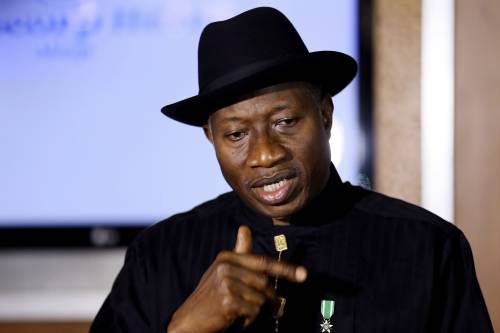Former President Goodluck Jonathan has cited his belief in the future of democracy in Africa as the reason he sacrificed his personal ambition for a second term in 2015.

The former President said this when speaking as a special guest of honour at the Oronto Natei Douglas Memorial Dialogue with the theme: ‘Nigeria’s Broken Electoral System, Uwais Report and Unfinished Business’, held in Abuja.
Jonathan, who was represented by Eze Akachukwu, his personal envoy, said he “sacrificed everything that may be important to people that believe that holding onto power was critical.”
“He believes in the future of Africa and that future can only be built on solid electoral processes. And he has continued this through his foundation (the Goodluck Jonathan Foundation) to pursue the work of democracy, peace and development.”
Jonathan commended friends and civil society activists, who organised the dialogue, for their efforts to sustain the legacy of Oronto Douglas, who was an environmental activist and his Special Adviser on Research, Documentation and Strategy. Douglas died in 2015.
In his speech, former Senate President Ken Nnamani said he has seen that the flaws in Nigeria’s electoral system means that votes can not count.
Nnamani, who was represented by an associate, Mohammed Tukur, said: “The Justice Muhammed Uwais Report on Electoral Reforms has many innovations that could restore credibility and fairness to our electoral system in the country.
“The 2019 elections also highlight a serious pathology of Nigerian elections. There is so much violence and crime associated with elections. Political desperation makes ordinary elections to resemble wars. We spend so much on providing security, yet we continue to witness a high level of violence and electoral crime.”
Jonathan, who was represented by Eze Akachukwu, his personal envoy, said he “sacrificed everything that may be important to people that believe that holding onto power was critical.”
“He believes in the future of Africa and that future can only be built on solid electoral processes. And he has continued this through his foundation (the Goodluck Jonathan Foundation) to pursue the work of democracy, peace and development.”
Jonathan commended friends and civil society activists, who organised the dialogue, for their efforts to sustain the legacy of Oronto Douglas, who was an environmental activist and his Special Adviser on Research, Documentation and Strategy. Douglas died in 2015.
In his speech, former Senate President Ken Nnamani said he has seen that the flaws in Nigeria’s electoral system means that votes can not count.
Nnamani, who was represented by an associate, Mohammed Tukur, said: “The Justice Muhammed Uwais Report on Electoral Reforms has many innovations that could restore credibility and fairness to our electoral system in the country.
“The 2019 elections also highlight a serious pathology of Nigerian elections. There is so much violence and crime associated with elections. Political desperation makes ordinary elections to resemble wars. We spend so much on providing security, yet we continue to witness a high level of violence and electoral crime.”






